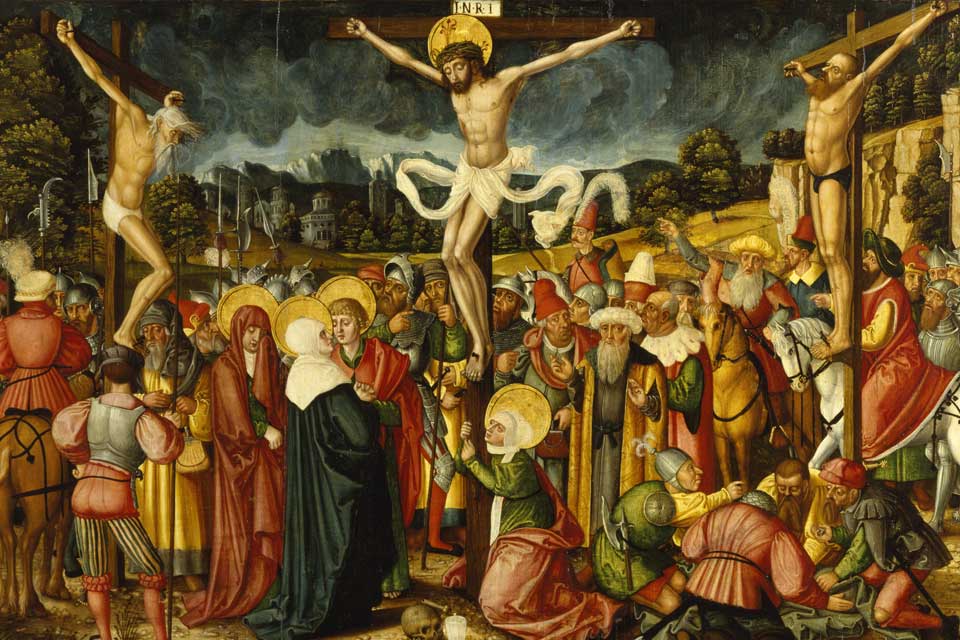Following are the prepared notes from Bishop Olmsted’s homily on September 8, 2019, at Ss. Simon and Jude Cathedral.
Today’s Gospel could easily be misunderstood and misused. Jesus says:
“If anyone comes to me without hating his father and mother, wife and children, brothers and sisters, and even his own life, he cannot be my disciple.”
These words explain why loving Jesus, even for His sinless Mother, is not always easy. Remember when He was 12, while the family was on pilgrimage to Jerusalem, Jesus got separated from His mother and Joseph. For 3 days, they searched frantically for Him. When, at last, they found Him in the Temple, Mary said (Lk 2:48ff), “Son, why have you done this to us? Your father and I have been looking for you with great anxiety.” He replied, “Did you not know that I must be in my Father’s house?” But Mary and Joseph did not understand. His answer made no sense to them. At that moment, Mary, Our Lady of Joy was Our Lady of Sorrows. Jesus’ words, at the moment, did not feel like love. They pierced her immaculate heart. When my father married my Mom, his mother was furious. How could her only son marry a Catholic? And join the Church? It took many years for Grandma to let go of the bitter anti-Catholicism she had inherited from her family. But she began the long journey to that freedom when her only son, my Dad while still loving his mom, put the love of God and wife first in his life.
Many times, the demands of love go beyond human understanding. They test our patience and rouse strong emotions. However, love, when authentic, is never separated from truth. Pope Emeritus Benedict XVI wrote (Caritas in Veritate, #3), “Without truth, charity degenerates into sentimentality. Love becomes an empty shell, to be filled in an arbitrary way…It falls prey to contingent subjective emotions and opinions, the word ‘love’ is abused and distorted, to the point where it comes to mean the opposite.”
“Did you not know that I must be in my Father’s house?” With these words, Jesus at 12 years of age taught His mother and St. Joseph that love of the Father had to be first in His life.
Putting God first in one’s life, loving Him with all one’s heart and mind and soul is the greatest of the Commandments; but it sometimes seems foolish in this world. As St. Paul reminds us (1 Cor 1:25), “…the foolishness of God is wiser than human wisdom, and the weakness of God is stronger than human strength.”
Today, Jesus teaches three conditions without which we cannot be His disciples. First, our commitment to Him must be greater than our attachment to any human person—even our mother or father or child. Now, Jesus does not advocate actually “hating” members of our family; rather He uses hyperbole to teach that love of our Maker must be greater than our love for any creature. Ties with our family are important but not absolute. Our first vocation is to follow Jesus. “He who loves father or mother more than me is not worthy of me”, He says, “and he who loves son or daughter more than me is not worthy of me” (Mt 10:37).
The second condition for being Jesus’ disciple is “to take up the Cross each day and follow after Him.”
A few days ago, we marked the 22nd anniversary of the holy death of St. Mother Teresa of Calcutta. For her, the love of Jesus was the one treasure of her life. And she found the face of Jesus in the poorest of the poor. A British journalist, Malcolm Muggeridge, travelled to Calcutta to interview Mother Teresa. She allowed him to do the interview on one condition: that it not interrupt her love of God and the poor. For a whole day, Mr. Muggeridge tagged along with Mother Teresa in the slums of one of the world’s poorest city. At the end of the day, after watching her bathe lepers, pick up the dying from the streets and show them the tender love of Jesus, he said, “Mother, I wouldn’t do this for a million dollars.” “Oh, Mr. Muggeridge,” she replied, “Neither would I…I would not do it for even 2 million. On the other hand, I gladly do it for love of Jesus.”
Jesus was always the center of her life. So, she was a true missionary of charity. She often said things that were not wanted but needed. She did things that were not welcome but necessary. To the degree that He becomes the center of our life, we too shall know a love beyond words. We shall know Jesus.
The third condition for belonging to Jesus is always to put people ahead of things, to readily renounce any possessions that become a roadblock to love of God or neighbor. Jesus does not promise that following Him will be easy. The cost is great because it is the cost of love, the cost by which Jesus saved the world. Pope Francis says we have a choice in life: either to be patient or to be grouchy; to take up our cross or to be angry. Our cross may be “the one thing we would change if we were in charge,” the person we would divorce or in another way eliminate, the personal defect that seems such a burden. But that is not love. That is selfish pride; that leads to isolation and emptiness. There is one way to happiness in life: to belong totally to Jesus. He purchased us by His Blood. We are not our own. It is His plan, not ours, that leads to fullness of life, even if we can’t understand how He is going to accomplish that. No one expected the Resurrection at the time Jesus died on the Cross!





